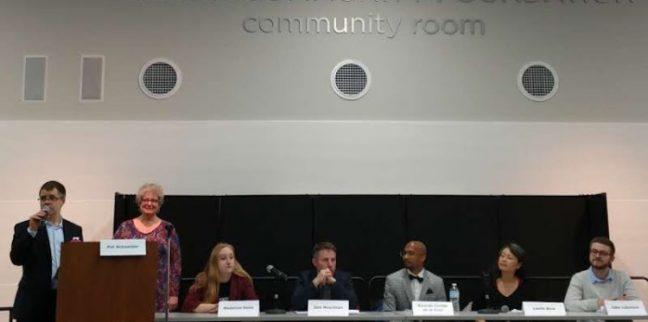The Capital Times hosted a discussion panel Wednesday evening about the campus free speech bill, which has drawn concerns from University of Wisconsin students and professors about its potential impact on student protest.
The panel consisted of five UW students and faculty who discussed the controversial campus free speech policy and the ways oversight and repression have censored free speech on campus.
Director of the La Follette School of Public Affairs Don Moynihan said the UW Board of Regents’ campus free speech policy — which punishes students who are found to regularly disrupt others’ free expression — somewhat unconstitutionally mitigated some of the ideas the state Legislature proposed.
“We should generally be skeptical of the state defining speech,” Moynihan said.
College Republicans Chair Jake Lubenow said the policy prevents the heckler’s veto from silencing conservative students on campus.
The Daily Cardinal Editor-in-Chief Madeline Heim said she had experienced a chilling effect among students who were worried about facing repercussions through their expression of free speech.
Heim also brought up the concern that the bill protecting the speech of one group could curtail the rights of another group to protest.
UW student activist Ricardo Cortez de la Cruz said new policy would not keep him or other activists from protesting on campus.
“If I’m hungry for sweet potato pie and my car breaks down, I’m going to take the bus,” De La Cruz said analogously. “Either way, I’m getting the pie.”
The panel also considered ways creative expression is impacted on campus. UW English and Asian American studies professor Leslie Bow believed the climate on a college campus impacted the materials she felt comfortable sharing in the classroom, which then harmed larger community conversations.
“When you’re already self-censoring, there’s a loss there,” Bow said.
Lubenow also voiced concerns regarding classroom settings as well. Some students worried about their voices being silenced in classes where their opinions did not match those of professors.
The panelists also explored the policy wording, including the specifics of “material disruption.” Bow said interruptions like the event where conservative pundit Ben Shapiro came to campus was not considered to be taking away an individual’s right to free speech.
“The speech was interrupted,” Bow said. “But the speech went on as planned.”


